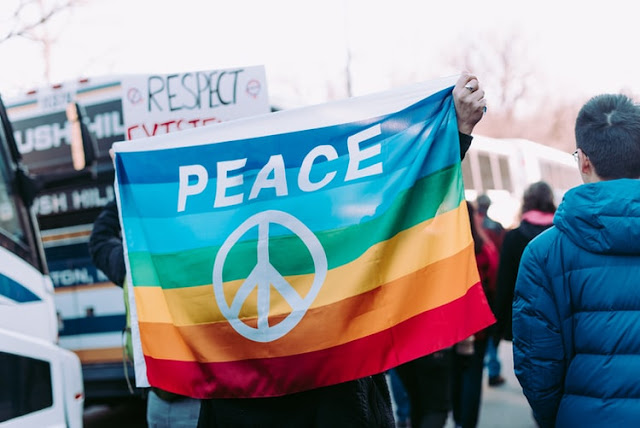The struggle IS real
Mark 1: 1-8
New Ark United Church of Christ, Newark, DE
December 6, 2020
This is the Sunday we light the Advent candle of peace. We light these candles as prayer, as the desire of our hearts, as what life could be: as realities already accomplished and as dreams not yet fulfilled. How do we find a sense of peace in a time such as this? Without justice there is no peace. We have made peace with that which does not give peace. There is so much grief and loss, uncertainty and hardship for so many that any extended peace we may enjoy feels like an extravagance, a shameful luxury that we wish we could share.
And yet we also light these candles as resistance. As the gospel of Mark puts it, this is “the beginning of the good news”, a record scratch, an interruption of the ways things are. Mark’s use of “good news” means good news of God’s deliverance, God’s justice, versus the Roman Empire’s use of the same term but as propaganda: instead it is the emperor who delivers peace. Of course the Roman Empire’s version of peace, Pax Romana—a two hundred year period from 27 BCE – 180 CE—was not defined as absence of conflict or war; there were a handful of conflicts during that period, including the one that led to the destruction of the temple in Jerusalem. Rather peace was defined as when adversaries were beaten to the point of no longer having the ability to resist.
For Mark, Jesus is the interruption to this inability to resist, the disruption to this so-called peace; Jesus is the deliverer of God’s justice and peace, the fulfillment of Isaiah’s prophetic vision. It’s a tricky thing to read Hebrew texts of hope and deliverance as giving voice to our own longings but not reading Jesus into them as Christianity traditionally has. I was even reluctant to have us sing the Advent carol “O Come, O Come Emmanuel” because of the lyric “and ransom captive Israel”. Christians have not supplanted Jews as God’s chosen people. Jesus is not the messiah of the Jewish people. Christians do not live in exile. What was once Christendom is not Israel.
But then a rabbi on Twitter reminded me that Israel means “to struggle with God”. Struggling with God is not only permitted but expected in the Jewish tradition. God expects that God’s people will struggle and question and wrestle and be challenged by God, that God’s people will even resist God and God’s ways. This is how human beings learn and grow, by using our critical thinking, seeking deeper meaning and wisdom, and then by how we live with that knowledge and spiritual courage.
In that same vein John the Baptist and Jesus challenged people about who God is, what God wants from us, and how we’re supposed to live. John proclaimed a baptism of repentance, a word us post-modern folks bristle at and often ignore at our peril. Jesus said he came not to bring peace but a sword. This peace we desire does not come easily nor is it promised as some simple reward for following the rules. It is not a peace without pain, but rather peace and pain are two sides of the same struggle, the one life.
Change does not happen without struggle. We chafe against things like “Defund the police” but Jesus’ “Repent, for the kin-dom of heaven has come near” still isn’t all that popular. We want change to happen peacefully, in manageable increments, but for those who need change the most, it is more “justice delayed is justice denied”. In her book Parable of the Sower, author Octavia Butler proposed that God is Change, which sounds a lot like the Buddhist principle of impermanence: all things must pass away and we are powerless against that. When we resist change, when we struggle against God, when we resist the impermanence of existence, that is when we suffer.
But if we love and we love deeply, we can’t help but be attached to this existence. And so how do we make peace with that? All that we touch, we change. All that we change, changes us. How did Jesus make peace with his own powerlessness? How do we make peace with uncertainty, with risk, with human beings, each of us with our own particular struggle with God?
When Jesus blessed and broke that bread and poured out that cup with his disciples, his friends, he was inviting them to join him on a journey, a deeper struggle with God and with human beings, a path that would shape them and change them forever. And he said to them, “Peace I leave with you, my peace I give to you. I do not give to you as the world gives. Do not let your hearts be troubled, and do not let them be afraid.” It is a peace that accepts that there will be no peace until there is justice, until there is wholeness, until we are willing to struggle not only for ourselves but for the most vulnerable, the marginalized and criminalized. God doesn’t show up in these wilderness lives until we show up in these lives and that is the heart of the struggle that is indeed real. That is where the struggle must come to an end and we will know peace.





Comments
Post a Comment